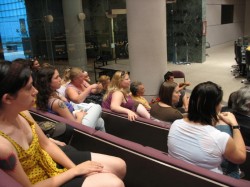 I’d estimate the turnout at about 200 or so. Even though it was held in Council Chambers, as far as I could tell there weren’t any councillors there.
I’d estimate the turnout at about 200 or so. Even though it was held in Council Chambers, as far as I could tell there weren’t any councillors there.
My note-taking skills are rusty. I’d try to write something down verbatim because it was so interesting or eloquently stated, but by the time I’d faithfully recorded the first half, the second half had evaporated from my memory. This happened repeatedly, so I ended up with a notebook full of eloquent yet incomplete thoughts.
There were five speakers, followed by a question/comment session from the audience. The five speakers included the researcher who conducted the study on whether the program works or not (Dr. Lynne Leonard), the Executive Directors of Bruce House (Jay Koornstra), the AIDS Committee of Ottawa (Kathleen Cummings ), and Ottawa Inner City Health (Wendy Muckle), and a young woman who is a former addict (Kristin).
I’m just going to list some of the things that struck me as interesting. I hope between my incomplete notes and my incomplete memory, I manage to produce an accurate, if incomplete, account. (But please let me know if you were there and you remember some things differently than me.)
Dr. Leonard did a Powerpoint presentation of the results of her research, which tracked the drug and equipment using habits of Ottawa addicts over a period of time. In short: The crack pipe program reduced equipment-sharing between users; the availability of clean crack pipes resulted in increased smoking and decreased injection of drugs. From a personal and public health perspective, this is an improvement.
Wendy Muckle, a street nurse, talked about the difference between supporting drug users and supporting drug use. She also noted that most addicts DO stop using drugs at some point. She said we have the ability to reduce the spread of HIV and Hepatitis C, and therefore we have the responsibility to do so.
She also – and I wish I’d captured this better, because it might have been the crux of the whole matter – suggested that City Council pulled a fast one on all of us by pitting homeowners and business against current drug users and those who work with them. She said it was a tactic that diverted attention away from Council as it abrogated its responsibility for poverty, housing and health in this city.
And finally she emphasized that crack pipes are a health device, not a solution to the drug problem, and she’s sick of all the talk about crack pipes. Crack pipes are neither the problem nor the solution, and she wants to get back to talking about real solutions to what’s going on in this city.
Kristin is a young woman who was born addicted to drugs and who has had her own struggles with drugs over the years. I think she said she hasn’t used drugs for several years now. One of the most powerful things she said was, by way of analogy, “Would you deny a sixteen-year-old a condom because you don’t think he should be having sex yet?”
Kathleen Cummings, Executive Director of the AIDS Committee of Ottawa (ACO), and also a former addict, put aside most of what she was planning to talk about to voice her outrage about something that happened several minutes earlier on her way to the washroom. I hope I got this right.
A reporter stopped her and told her that a city councillor had suggested that the ACO’s funding from the city might be in jeopardy next year. It’s an old trick, silencing the dissenting voices by threatening to withdraw their funding. I don’t think it’s going to work on ACO. Cummings was angry and she didn’t strike me as the type of woman to be silenced by anger or by threats.
She was passionate and eloquent. She talked about freedom of speech and then about harm reduction. “Harm reduction,” she said, “Is about meeting people where they’re at.” She went on to add that harm reduction is also about detox, housing and treatment. And she talked about City Council’s failure to meet the needs of its constituents.
The Moderator was interesting too. I didn’t quite catch his name – maybe Brian? He talked about being diagnosed with HIV 22 years ago and being outraged years later to discover that the Canadian government, during the era in which he was infected, had been confiscating and destroying educational material aimed at gay men to protect them from the spread of HIV.
Essentially, there’s a history of vulnerable groups being denied health protection by governments for moral reasons.
Okay, that’s it for now. I’ll write more later about the Question and Answer portion of the evening.
















I got a reply from the office of George Bedard, written by the summer student it appears. It’s quite lengthy so I’ll email it to you.
I got a reply from Maria McRae too, as well as one from the Mayor’s office. Mine weren’t lengthy; they didn’t actually say much.
From the mayor: “Council and I are in the process of working with provincial officials, city staff, the Medical Officer of Health and the Ottawa Police Services to secure funding commitments for the establishment of an addiction treatment facility here in Ottawa as a holistic solution to the issue of drug abuse and addiction in our city.”
I’m glad you went. I’m interested to hear what happened next.
Malva, did you email it yet? (I never got it.)